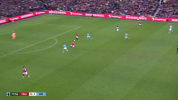Especially as the German and French versions have "influence" (and Spanish has "affect"). Spanish actually has not "interfering with an opponent" but "interfering with the play of an opponent".
German has what may be helpful in the case that this should be called offside:
"clearly tries to play the ball near him if this action influences an opponent,
or
clearly becomes active and thus clearly influences the opponent's ability to play the ball" (rather than "making an obvious action").
Or the French:
"clearly tries to play a ball that is near when this action influences the reaction of an opponent; or
makes an obvious action that clearly influences an opponent's capacity to play the ball;
[Cue someone to say the English is the definitive version, but this is not about what it says but what it means. It's still a challenge for all those who want to rely on the letter of the law "as it stands" in the English version.]
Is there a "chat de l'arbitre" in French? I didn't get much when I googled...
English
is the definitive version
I'm no language expert, but I know that often translating languages literally is almost impossible, as the way the languages are spoken, sentence construction etc. Changes completely. Your chat de l'abitre is a good example of this in that the two words are switched around... I know the literal translation would be actually be "refchat" but but let's say we want to do referee chat, the translation literally word for word is chat referee, which is just not how we order words and is essentially back to front. So let's not pretend we can find a hidden meaning in another language.
If we do that, then we are creating more offside offences that we know the law specifically doesn't want.
Prime example, player in offside position, ball played towards them, defender intercepts the ball. Had the player not been there the defender could have left the ball.
In that example, the defender is influenced to intercept the ball by the offside player yet we know this is not an offside offence. (Diagram 8)
Influence Vs impact I agree there is some similarity in 1 of the definitions... Such is the complexity of the English language we have several for impact.
But you still over look the fact we're not looking at the one word and it's definition, were looking at what the whole sentence means and you lose sight of "ability to play the ball".
To be able (ability) to play the ball then one needs to be in a position to do so (playing distance). At no point is a city player able to play the ball, so their ability to do so can't have been impacted.
The city defender is not impeded by rashford, he slows and gives up the chase. He will have heard Fernandes calling for rashford to leave it, and the actions of rashford are the natural actions of someone putting the brakes on a sprint, there's no Feinting, just a player running at probably 30+km/h attempting to stop before touching the ball or interfering with his team mate








